In Korea, men never used to be questioned. In a society that has been through Japanese colonial rule, liberation, Cold War Era civil war, and 70 years of antagonistic competition between the regimes of the North and South: What does it mean to be a man?
A flood of questions now face Korean men who have not been questioned, doubted, or asked to do a thing over the last 70 years, and who have been respected solely on account of their existence.
Who are these Korean men who beat women within an inch of their lives or actually kill them and who fill up article comments with justifications for abusers (as with the recent Isu Station assault[1], where “both parties were to blame”) and sympathy for murderers (as with the Geoje assault and murder[2]). Why are they so angry at women that they cannot even recognize or accept the basic worth and rights that women have as fellow human beings?
There are countless reports and controversies on some of the young women’s groups, such as Megalia (Megal) or Womad[3], that have officially expressed their intention to “mirror” men’s actions, but why are we not questioning the Korean men who physically assault or kill women?
Korean, Men (written by Choi Tae-seop and published by Eunhaengnamu) is a historical review of Korean men’s masculinity, which is at the center of many controversies today. It is difficult to sympathize with their anger at being “reverse discriminated” against by women or people with disabilities. Yet we also cannot simply criticize and judge them for thinking that way.
Men’s strong backlash against feminism is, as confirmed in American journalist Susan Faludi’s book Backlash, a serious global problem and will remain one until patriarchy’s dying breath.
However, Korea did not experience a civil revolution in the process of its transition from modern to contemporary. There is no social consensus on individuals (citizens) as political actors and the human rights of people. Members of society were not educated on these topics. Under such circumstances, the rage of angry men can plunge an entire society into danger.
In order to question Korean, Men and to learn about them, Choi Tae-seop, himself a Korean man in his mid 30s, wrote a book. He said that he plans to continue with his sociological research on Korean men.
The following is an interview with Choi, held on November 12.
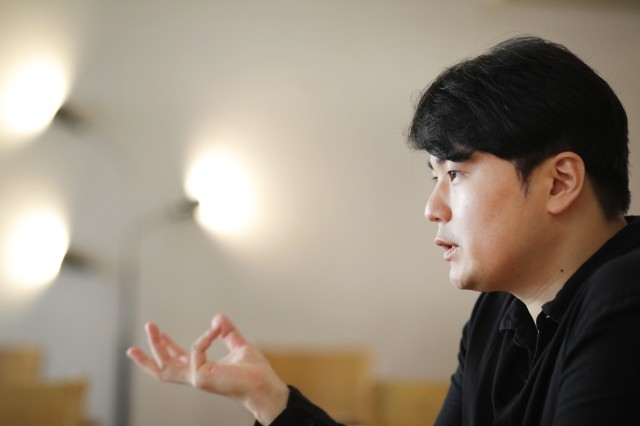
Culture critic and sociologist Choi Tae-seop | Pressian / Choi Hyeong-rak
Korean, Men
Choi Tae-seop: This book is literally about masculinity in Korean society. When you hear the words “Korean” and “men”, there is another word that you think of immediately (hannam).[4] That is why the comma between “Korean” and “Men” is important. It’s there to make people think about not just Korean men, but masculinity or the existence of men in the context of Korean society.
Choi Tae-seop: At the center of all recent controversies is hannam. If we need to fight against or coexist with hannam, shouldn’t we get to know them? That was what prompted me to take a look at masculinity in Korean society throughout history.
Men’s studies in Korea started in the 1990s when Chung Chae-ki, professor of Education at Kangwon Tourism College, introduced related papers in his study of childcare. But at the time, men’s studies focused on making “good fathers” out of Korean men. Men’s studies conducted by men disappeared in the 2000s, as its purpose was distorted and became anti-feminist studies. Feminists instead began to critically approach this field by focusing on colonial masculinity and research on militarism. Korean, Men relies a lot on that research
Choi Tae-seop: Masculinity began to stir after the 1990s. In the first half of the 1990s, there were attempts to study and look into masculinity, but after the Asian financial crisis from 1997 to 1998, the discourse on ‘men with drooped heads’ emerged, which evoked sympathy from the public. The position of men as breadwinners in Korean society, however, was unstable even before the Asian financial crisis. Men then were only pretending that nothing was changing.
A fiction that was never true: men = breadwinners
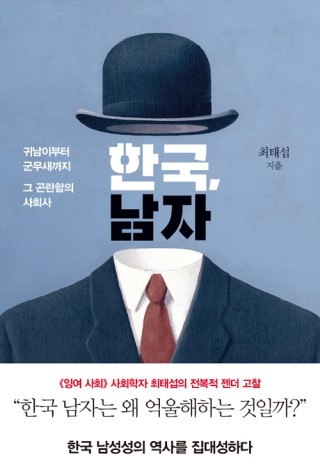
The full book title is Korean, Men: A Social History of Difficulties, from Gwinam to Gunmusae | Published by Eunhaengnamu
Choi Tae-seop: Masculinity in Western society appeared with the establishment of bourgeois society and is based on the division of labor by gender. Men were breadwinners who were also in charge of official tasks, while women were in charge of household chores and child rearing in the private sphere. Korean society also accepted the idea that men were breadwinners, which played an important role in the logic of mobilization. They did in fact work, sometimes to death, because they “had to provide for the family”. On the other hand, they were extremely frustrated about not being able to provide for their families.
Choi Tae-seop: I’m not sure if men today want to be breadwinners. Men often use the expression “money making machine” to describe themselves when complaining about the injustice they feel in society, but I wonder if those who say that actually play that role. Moreover, men are well aware of the fact that it is now impossible to maintain their families with only their income.
But unrelated to the possibility of actually becoming breadwinners, the concept of male breadwinners functions as a norm for masculinity. Being unable to satisfy that norm is considered a reason for disqualification, which renders men frustrated. And this frustration, I believe, results in erroneous anger.
Choi Tae-seop: For Koreans in their twenties and younger, women are outperforming men in most areas. Of course, that changes in their thirties, which results in a huge difference in employment rates between men and women. But when you focus on the people in their teens or twenties, men are constantly falling behind in competition. This probably makes them think, “The world is generous to women but harsh on men.”
Men who are reacting to the recent feminist issues argue that they are victims or minorities. They’re not fighting as people who have enjoyed privilege in life and want to keep it that way. Their victim mentality is real. Of course, it doesn’t make sense in the social reality where women face much more discrimination.
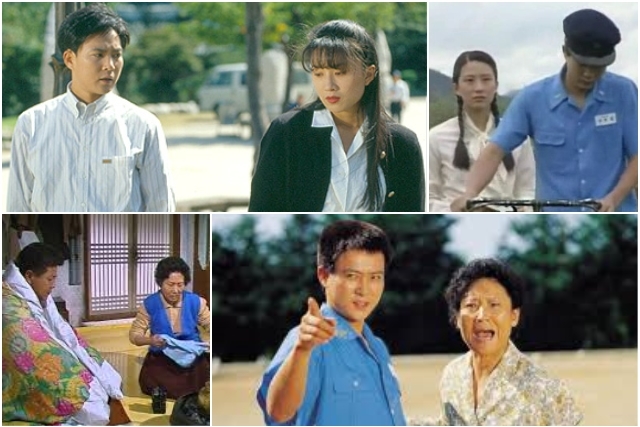
Scenes from MBC drama series Son and Daughter, aired from October 1992 to May 1993. With two main characters who are fraternal twins, Gwinam (played by Choi Su-jong) and Hunam (played by Kim Hee-ae), the series highlighted the issues of favoring sons over daughters and patriarchy in Korean society. The twin’s father Lee Man-bok (played by Baek Il-seob) is depicted as a man who doesn’t look after his family.
The military used to be the ‘masculinity factory’, but is no longer an honorable institution.
Choi Tae-seop: Colonial masculinity is a problem that many men in colonized countries experience. The men of the colonizing country are considered ‘real men’, while the men of the colonized country are considered ‘fake men’ or ‘feminized (castrated) men’. In Black Skin, White Masks, Frantz Fanon says that black Algerian men consider it an honor to sleep with mentally disabled white French women. This is something that resulted from a colonial problem intersecting with a gender problem.
As for Korea, we were colonized by Japan, but compared to say white and black people, there was little racial difference between Koreans and Japanese. This probably increased the confusion among Korean men. Moreover, at a time when Koreans were burning up with nationalistic passion, Korean men accepted from Japan the idea of aggressive and progressive Western masculinity but had no country to display their masculinity for. A considerable number of nationalists became pro-Japanese in colonial Korea, and I wonder if working for a bigger empire was their idea of becoming real men.
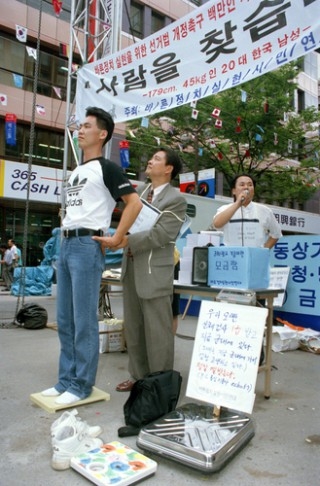
In the middle of Myeong-dong, Seoul, on August 1997, a young man is being measured to see if his physical conditions (height: 179 cm, weight: 45 kg) are similar to those of the son of Lee Hoe-chang, a presidential candidate of the New Korea Party | Yonhap News
And the military problem. When talking about the issue of masculinity in Korean society, the military is a serious problem. The Park Chung-hee administration, in particular, made the military seem like a place you go to get your masculinity and the military service as something that was sacrosanct. The military in the 1950s and 1960s also served as an educational institution where people were taught skills and to read and write. I believe that’s why people used to say, “The military makes a man out of you”. After the Park Chung-hee administration, Korean society rapidly became militarized. Schools, companies, and many other places were operated with the same military logic.
But serving in the military is not an honorable thing anymore. Most men who now serve in the military [do not do so voluntarily and] have received college education. In particular, as individual rights became important after democratization, people began to question the military service. But the state is unable to provide an answer.
In addition, the military itself has long been stratified. On a societal level, there’s the issue of the leaders and the wealthy avoiding military service. Some even say that students who attend prestigious universities apply for KATUSA, officers in the air force, or officers in the navy, in that order. Most students from other universities serve as rank and file. The military used to emphasize equality at one point in time, but now there are differences. For some, the military is now simply another place where they experience another type of discrimination, and as a result they feel relative deprivation.
Fear lies behind their derision and name calling like doenjangnyeo (bean paste women) and kimchinyeo (kimchi women)
Choi Tae-seop: In the late nineteenth century, The Independence asserted that the “Korean race” was inherently superior and therefore could overcome this “temporary difficulty” of colonialism as long as we “work hard”. It further claimed that Koreans were “smarter, more hardworking, and cleaner than Chinese and physically stronger than Japanese”. And people have also said that Koreans are second only to Jewish people in terms of cleverness. Could we say that these aren’t racial ideas?
The Orange Tribe[5] from the 1990s is also a very racial term. It includes the envy people feel toward those who have been to the United States and have experienced the Western order.
Derogatory terms such as doenjangnyeo and kimchinyeo include cynical resignation toward a racial order in the world. All Koreans who were born and raised in Korean society are all doenjang and kimchi. And even if Koreans do end up going abroad, it is difficult to overcome this kind of inferiority complex. It’s particularly strong in Asian men who have lived in a strongly patriarchal order. And they come to believe that women have a much easier time crossing the boundaries. This kind of jealousy is contained in terms like doenjangnyeo and kimchinyeo. Behind such name calling lies fear. There is an arbitrary and racial anxiety that they might be defeated in competition with Western men and end up losing the women of their own country.
“Moreover, the point that Korean men wish to convey through such name calling and cynical language—that “you are all the same”—is not aiming for the limit or the bottom of humanity but is created within the limitations of their own knowledge, situations, and desires. For instance, their simplified and cynical world view—‘Men want sex and women want money’—was derived not from animalistic instinct but from social relationships. And even though there are many problems that cannot be explained with this simple idea, it is still established as human instinct. (p. 220)
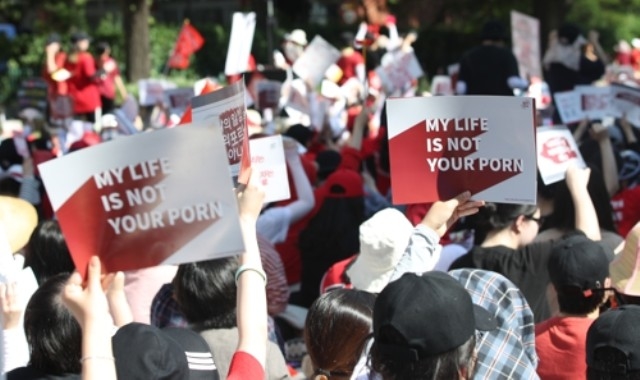
Women at the Hyehwa Station protest against the police’s biased investigation of an incident involving a female student taking a picture of a nude male model and circulating the picture. The pickets say “My life is not your porn” | Yonhap News
Choi Tae-seop: It’s because they don’t think they’re under threat, unlike Korean men in their teens and 20s. But when you look into it, elite men of the older generation are the ones who hog all social resources. They are also a big part of the masculinity issue in Korean society.
The difference between Korean men is serious as well. Many Korean men envy Lee Jae-yong[7], Chung Yong-jin[8], or people who are less rich than those two but still rich. But not everyone can be rich. Most tend to work overtime for meager wages at companies. But when you think about it, they’re suffering because of the exploitative structure created by people like Lee Jae-yong and Chung Yong-jin. Yet Korean men’s anger is focused on those who are weaker than them. And ultimately, that’s because of efficacy. It’s the issue of who hurts more when you hit them.
Korean men, a difficult problem
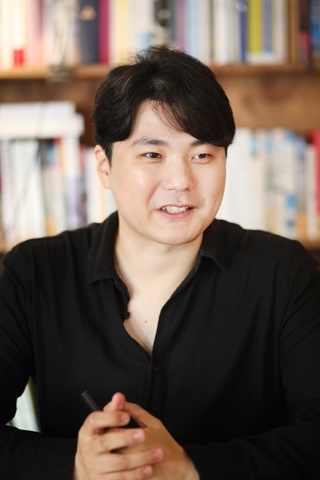
Choi Tae-seop| Choi Hyeong-rak
Choi Tae-seop: In the foreword to this book, I described Korean men as “difficult beings” and explained that the difficulty is double layered. Korean men have never been able to create an ideal image of men. And after the 2000s, Korean men lashed out, saying “We don’t want to protect women’s rights” and “We hate feminism”, yet they still want to be acknowledged by women and need women in various aspects.
On the other hand, they are perplexed. Koreans go through their school years repressing pleasure and desire. Many parents promise them the future, as though dating happens naturally once you enter college. But in reality… for men, at least, dating doesn’t happen naturally, and instead they have to compete with their female classmates. The future that their parents promised doesn’t come true and they only feel deprived.
Choi Tae-seop: One, they lack self-esteem. As a result, they use their ego only in front of those who are weaker than them.
Korean men can be largely divided into fathers and sons. But Korean fathers aren’t close to their sons. Fathers are always missing in their families. In particular, after the Asian financial crisis, when we learned that the equation father=breadwinner was false, we started having questions: What is a father’s role in a family? What does he do?
And since there isn’t an adequate role model, the son generation is nostalgic for a patriarchal utopia that never existed even during their father’s generation. They are pining for a past that never existed and that they never experienced.
What does “smeared with PC” mean? Misogyny becomes play
Choi Tae-seop: It is natural for adolescents to have a certain amount of hostility toward the other sex. At the same time their interest in the other sex grows as well. That is why it is necessary to provide an environment and education where girls and boys can develop a good relationship with each other. However, Korea’s education system doesn’t allow for it—in particular, parents look down on their children having boyfriends and girlfriends because their grades might go down or something might happen. Schools also prohibit students from dating.
I think that perhaps that is why the teen culture is becoming harsh, and teens are growing strongly antagonistic toward each other. Perhaps we’re not just prohibiting them from dating, but are also not treating them as fully human. Adults push and shove adolescents as they want but at the same time force them to be respectful of other people. This only reinforces their lack of responsibility.
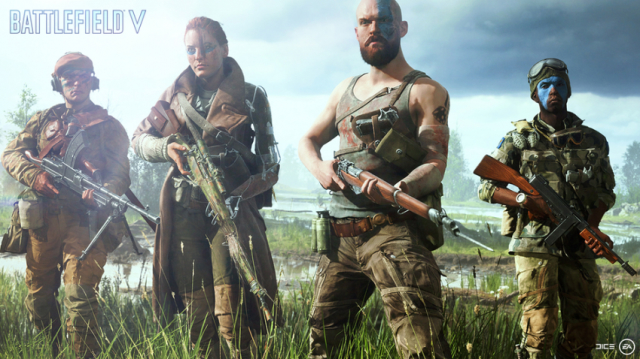
The game Battlefield 5, where the “PC” (political correctness) controversy began.
Choi Tae-seop: Video games have become a key play culture for boys in their teens. Something that is learned through playing lasts longer than something that is learned through education. Although not all games depict women inappropriately, a majority of games do. This has been pointed out in North America, and there were movements to correct these issues, but these movements clashed with the resistance of male gamers in both the West and the East.
There’s an expression “smeared with PC (political correctness)”. It’s a criticism applied to games and comics that reflect the perspective of minorities and refrain from inappropriate descriptions of women. The video game industry is huge, and games are one of the media that has a huge effect on society. Just like films and other video media, games have an impact on our society that we cannot ignore. Many male gamers assert that games belong to them and insist on respect for consumer demand. But men are not the only sex that plays video games.
“In the video game culture, real women are people who interfere with games. Mothers, teachers, society, wives (girlfriends) ignore men’s desires to play video games and actively try to interfere with it… The reason young men came to regard the Ministry of Women and Family, without understanding what the ministry actually does, is because it is in charge of enforcing the ‘shutdown law’.[9] (p. 242)
Choi Tae-seop: It is difficult to lay the blame on someone, but this tragedy began from the parents’ wish: “I wish my child would live happily.” Since learning was overtly emphasized for the sake of children’s futures, there is not enough time or resources to think about and develop a variety of kinds of fun. As a result, everyone plays the same things, which increases the influence of certain things.
If we want to resolve this issue of Korean teenage boys, we need to give Korean adolescents, both boys and girls, more rights and authority. Education should be the process of individuals becoming citizens, and by guaranteeing their rights, we need to let them realize that other people also have the rights and authorities they do.
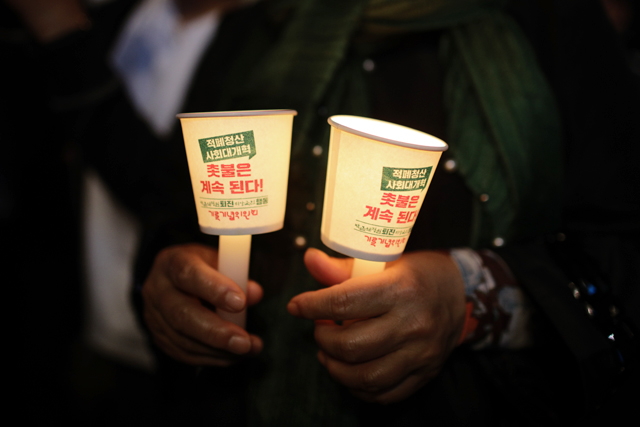
Choi Tae-seop| Choi Hyeong-rak
Choi Tae-seop: It’s become difficult to even say that we need to look for alternatives, because people have become so cynical. Even the internet comments have changed. Instead of expressing their anger, people now simply ignore each other. People call it ‘filtering’—rather than confronting someone to resolve their conflict, they ignore each other and skip over the issue.
This is directly related to the issue of trust in Korean society. It is important to build trust in that we can do something if we work together. The candlelight impeachment rally was an example, but since then people are constantly being disappointed. This is a really bad sign. If this continues, it is very likely for the right-wing politics to combine with the public, as is the case in the United States, France, and Italy.
Choi Tae-seop: Even if Korea’s conservatives are below par, there is a possibility for conservative populists to gain power. There is no law that says there shouldn’t be a Korean Trump. Although the Democrats did gain control of the House during the midterms in the US, Trump still fanned people’s hostility toward the Democrats by painting them as an elite group.
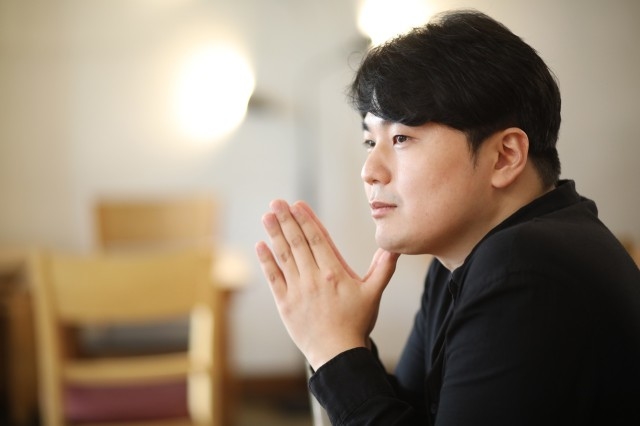
Choi Tae-seop| Choi Hyeong-rak
Choi Tae-seop: There was only one problem that I focused on as I started writing and even as I finished writing. How can we all live as individual actors without oppressing others and instead bonding with and caring for others?
The answer to masculinity in Korean society is not “We need to be real men” or “We should be good fathers”. It should be “We need to be independent and autonomous humans” who can ask and answer questions. And various sexual identities need to be freed from all kinds of discrimination and biases. And people need to be able to acknowledge each other as they are. And I hope people read Korean, Men with that in mind.
This article comes to you in partnership with Pressian. Have feedback for the writer? Send us a mail or sign up for the newsletter.

